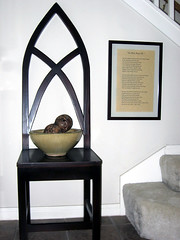In 1982 I discovered Interview magazine. In a word, it was cool. The music it covered, the clothes featured on its oversized pages, the photography style. Even the non-coated paper, column sizes and fonts were on the edge for a publication back then. It was cool, and I wanted to be. But of all the things I am or I was at the time, you wouldn’t use “cool” to describe me.
Still though, I did find something in those pages that so far has lasted my lifetime. It’s a poem by an anonymous writer. There was no introduction to the poem, no story of its path to the magazine page, nothing at all but the poem and the word Anonymous beneath it.
For years I carried it with me in my wallet. And then for years I kept it in my jewelry box. Over time, and no doubt its time in my wallet, the edges of the paper have become tattered, the fold creases deep and permanent, and the paper color yellowed a bit. Last year, I had it framed, pressed and floating between two pieces of glass, and hung it in the entryway of my home.
This poem touches me with its simplicity and hope. I read it often and throughout the years I've found myself in different lines, but it’s in the truth of the last two lines that I find the strongest connection.
“You Must Always Tell…”
You must always tell the world what you’ve been through,
It does concern the curious who pass;
The stories of our hearts and of our dead
Can all improve our image in the glass.
I am a child who carefully picks her way
Here, or down there, or anywhere I stop
Tipping my had to twenty thousand truths,
Deep in a Now about to open up.
You must always tell the world just what you’ve learned;
It was not chance that took you where you went.
And when I search my pockets what I find
Is far more hope than I have ever spent
You must always tell your secrets to the world,
Those passers-by whose business is the same;
And those from a land where all that’s holy’s dead
May not themselves be totally to blame.
You must always tell the world that you’ve been happy,
Loaded with talent, yes, a great success,
That you built beacons from brutality
And made your music from the pain of love.
We cannot both be ignorant and live
Let’s not just say we sheltered here a while
When one’s known death, and life–which is always there,
One tries to make a poem—and to smile…


3 comments:
Wow!!!
I could have written that entry myself. Just today I found my very wasted copy of that poem (that has survived many movings through more than 25 years!) and decided to Google it and find the author of this extraordinary poem that, as you say, has lasted ever since. The only answer I got was the link to this page.
I sort of remember it printed over the image of some female performer hence, it always thought it was part of a play.
Amazing to find it now in your blog and that we have almost the same feelings for it. Thanks so much!!!
Mhmm, got a question.
Since I copied the poem I might be very wrong on this one but on the line that you quote as:
And made your music from the pain of love.
We cannot both be ignorant and live
What I have is:
We cannot both be ignorant and line
And I corrected it with my pencil to convert the V into an N so now, I am confused.
Line could mean, in a very broad sense, to conform and that could fit in that verse.
Oh, I wish you read this. I'll come back to check if you say something!!!
Mariola -- not sure if you're still checking, but the line is "live", at least as it's printed in the Interview Magazine version.
Post a Comment